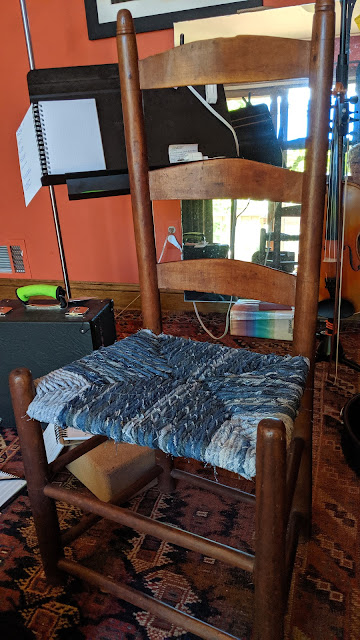Is the Truth Important?
Last weekend the radio show This American Life issued a retraction of a program they broadcast in January. "Mr. Daisy and the Apple Factory" was an excerpt of a one-man show. Mike Daisy, a self-described "worshipper in the cult of Mac" went to find out first-hand about the working conditions of Chinese factory workers. I was not the only one who found the story powerful. Daisy is a great storyteller. The show was the most downloaded in This American Life's history.
Then it was discovered that many of the elements of Mike Daisy's story are "a mix of things that he just heard about or researched." As in: they didn't happen to him. As in: saying that they did is not the truth.
In his interview with This American Life host, Ira Glass, Daisy defends his work, although he admits it's inappropriate for a journalistic radio program: "I stand by it as a theatrical work. I stand by how it makes people see and care about the situation that’s happening there." In other words, even though it isn't true, it makes people care. And therefore it's ok. In taking this attitude, Daisy has plenty of company: the news is full of politicians, authors and talk show hosts who've fabricated "facts" to evoke a strong reaction. More disturbing is that these public figures don't seem pay a price; apparently lying to make a point is no big deal.
Is the truth important? Of course it's important. The truth is radically important. It's insanely important. After all, if you can't distinguish truth from reality, isn't that a definition of insanity?
We can all distinguish truth on some level, and know that truth is better than untruth. Consider:
Your girlfriend tells you she really loves you. It evokes powerful feelings. How would you feel if you knew it was a lie?
Your best friend says she is late because she got a phone call from the doctor and she has cancer. You forgive her, of course! Would you feel that way if you knew it wasn't true?
Your son tells you he got an A on his test. You release him from being grounded. Of course it matters if it isn't true!
Why do so many of us want to accept, then, that sometimes a lie is ok? Perhaps they feel, as I do, that seeking the truth can be confusing, nuanced, and sometimes even futile. Religion, global warming, drug claims, health care, gun control, economic recovery - all of these and many more are vital issues that affect our daily lives. With such a dizzying flood of facts to puzzle out, isn't it more comforting to bask in the glow of a strong feeling, negative or positive?
As for why people lie, I think there are two main reasons: People lie to get something ("I'm 21"), or they lie because they don't want to admit some reality about themselves ("I'm 39").*
Mike Daisy admits to both these reasons when confronted by Ira Glass: "Did you ever stop and think: okay these things aren’t true, and you have us vouching for their truth?" Daisy admits that he was afraid that the producers would find out the story wasn't true, and he felt much of the story was the best work he'd ever made. In other words, first he lied to get his story on the air, and then he lied because he didn't want to admit that his best work was based on a fiction.
Saying the words "I lied," "I didn't tell the truth" can ruin your reputation and make people think less of you. But it's often more difficult to handle facing the truth about yourself. It's easier to build a story about yourself that skews your motivations, or events, or both, and then build another story that, when found out, calls the lie by another name.
To test this theory, try a simple exercise:
Think of a small, inconsequential lie or omission you've made recently. Maybe it's why you were late to work, your reason for refusing an invitation, or why you're returning something to the store. Now sit with yourself. Imagine you're with someone who will forgive everything you say (this part is important). Explain why you lied. Keep going. Don't stop after the first reason. Why do you need a cheaper price? Why do you need someone to think it wasn't your fault you were late? If you can approach these questions with curiosity rather than judgment, you may find you learn a lot. It may be uncomfortable, but all humans are so highly fallible! You have plenty of company!
Most of us don't pay the consequences for lying in the public way that Mike Daisy has. Nevertheless we live with those consequences when we turn away from the truth about ourselves. When we know more about ourselves, we can be more effective in our actions, taking control of our lives, and being more open and fearless in our interactions. If you don't believe me, try it! And let me know how it goes!
*Excluding of course, lies that are to protect you or someone else - although even these can get slippery pretty fast.
Then it was discovered that many of the elements of Mike Daisy's story are "a mix of things that he just heard about or researched." As in: they didn't happen to him. As in: saying that they did is not the truth.
In his interview with This American Life host, Ira Glass, Daisy defends his work, although he admits it's inappropriate for a journalistic radio program: "I stand by it as a theatrical work. I stand by how it makes people see and care about the situation that’s happening there." In other words, even though it isn't true, it makes people care. And therefore it's ok. In taking this attitude, Daisy has plenty of company: the news is full of politicians, authors and talk show hosts who've fabricated "facts" to evoke a strong reaction. More disturbing is that these public figures don't seem pay a price; apparently lying to make a point is no big deal.
Is the truth important? Of course it's important. The truth is radically important. It's insanely important. After all, if you can't distinguish truth from reality, isn't that a definition of insanity?
We can all distinguish truth on some level, and know that truth is better than untruth. Consider:
Your girlfriend tells you she really loves you. It evokes powerful feelings. How would you feel if you knew it was a lie?
Your best friend says she is late because she got a phone call from the doctor and she has cancer. You forgive her, of course! Would you feel that way if you knew it wasn't true?
Your son tells you he got an A on his test. You release him from being grounded. Of course it matters if it isn't true!
Why do so many of us want to accept, then, that sometimes a lie is ok? Perhaps they feel, as I do, that seeking the truth can be confusing, nuanced, and sometimes even futile. Religion, global warming, drug claims, health care, gun control, economic recovery - all of these and many more are vital issues that affect our daily lives. With such a dizzying flood of facts to puzzle out, isn't it more comforting to bask in the glow of a strong feeling, negative or positive?
As for why people lie, I think there are two main reasons: People lie to get something ("I'm 21"), or they lie because they don't want to admit some reality about themselves ("I'm 39").*
Mike Daisy admits to both these reasons when confronted by Ira Glass: "Did you ever stop and think: okay these things aren’t true, and you have us vouching for their truth?" Daisy admits that he was afraid that the producers would find out the story wasn't true, and he felt much of the story was the best work he'd ever made. In other words, first he lied to get his story on the air, and then he lied because he didn't want to admit that his best work was based on a fiction.
Saying the words "I lied," "I didn't tell the truth" can ruin your reputation and make people think less of you. But it's often more difficult to handle facing the truth about yourself. It's easier to build a story about yourself that skews your motivations, or events, or both, and then build another story that, when found out, calls the lie by another name.
To test this theory, try a simple exercise:
Think of a small, inconsequential lie or omission you've made recently. Maybe it's why you were late to work, your reason for refusing an invitation, or why you're returning something to the store. Now sit with yourself. Imagine you're with someone who will forgive everything you say (this part is important). Explain why you lied. Keep going. Don't stop after the first reason. Why do you need a cheaper price? Why do you need someone to think it wasn't your fault you were late? If you can approach these questions with curiosity rather than judgment, you may find you learn a lot. It may be uncomfortable, but all humans are so highly fallible! You have plenty of company!
Most of us don't pay the consequences for lying in the public way that Mike Daisy has. Nevertheless we live with those consequences when we turn away from the truth about ourselves. When we know more about ourselves, we can be more effective in our actions, taking control of our lives, and being more open and fearless in our interactions. If you don't believe me, try it! And let me know how it goes!
*Excluding of course, lies that are to protect you or someone else - although even these can get slippery pretty fast.




Comments
Post a Comment